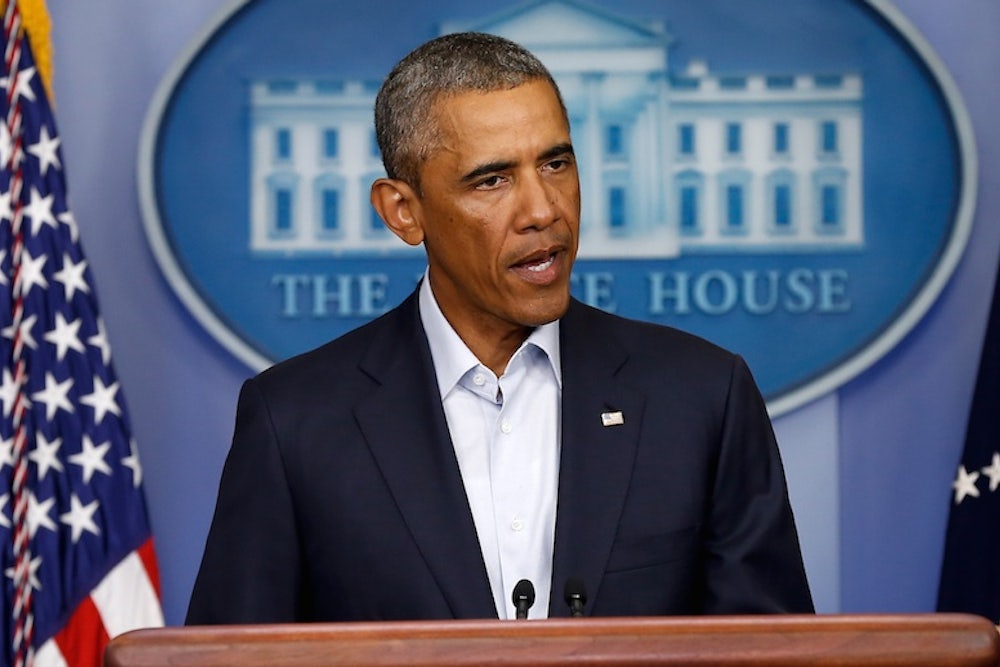On Monday, addressing the death of Michael Brown and the ensuing unrest in Ferguson, Missouri, President Barack Obama said that "a gulf of mistrust exists between local residents and law enforcement. In too many communities, too many young men of color are left behind and seen only as objects of fear." He called for listening over shouting, unity over division. "And that’s how we bring about justice, and that’s how we bring about peace."
To some, those words weren't enough. “Barack Obama is either very tired, doesn’t believe a single word he’s saying re: Michael Brown, or both,” Slate writer Jamelle Bouie tweeted. Others, like Vox's Ezra Klein, defended the measured speech. “The problem is the White House no longer believes Obama can bridge divides,” Klein wrote. “They believe — with good reason — that he widens them.”
On the issue of race, that may be true; an impassioned speech on racial inequality could only further polarize the country and inflame tensions in Ferguson. But there is no excuse for the president's tepid remarks on the Ferguson Police Department's militarized police response to the protests in Ferguson.
Reporting from Ferguson has shown that the police's response has only exacerbated tensions. CNN’s Jake Tapper, reporting Monday near the protests, said, "Nobody is threatening anything. Nobody is doing anything. None of the stores here that I can see are being looted. There is no violence…. Absolutely there have been looters. Absolutely, over the last nine days there's been violence. But there is nothing going on this street right now that merits this scene out of Bagram. Nothing. So if people wonder why the people of Ferguson, Missouri, are so upset, this is part of the reason.”
Ferguson enjoyed one brief period of calm last week, when the State Highway Patrol—led by black Ferguson native Captain Ron Johnson—took over for the local police and began interacting with the protestors. It worked. But then the Ferguson police, against the urging of federal officials, released a tape of Michael Brown apparently stealing cigars from a local convenience store earlier on the day of his death. Smelling an attempt at character assassination, protestors returned in force. Small groups of troublemakers looted stores and attacked the police, as Johnson’s police force returned with riot gear and tear gas to confront them. And now an actual military body, the National Guard, is in Ferguson.
Law enforcement in Ferguson has been widely—and rightfully—criticized for these actions. But Obama did nothing of the sort on Monday, instead offering only generalizations. “There’s no excuse for excessive force by police or any action that denies people the right to protest peacefully,” he said. “So, to a community in Ferguson that is rightly hurting and looking for answers, let me call once again for us to seek some understanding rather than simply holler at each other. Let’s seek to heal rather than to wound each other.” He added that it was “probably useful” to review how local law enforcement has used federal funds to purchase military equipment.
But to fault both sides—the black community and the police—is to engage in false equivalence. The police have been the provocateurs in Ferguson, firing tear gas at will, and the few troublemakers in the crowds don't warrant the excessive police response.
Obama, as president, has always preferred sober statements to impassioned rhetoric. Perhaps he worries that denouncing the cops would incite more violence. Perhaps he considers it inappropriate to critique local law enforcement when they have a better understanding of the events on the ground. But if there’s anything we’ve learned over the past week—and from previous race riots like in Cincinnati in 2001—it’s that the best way to ease tensions is to communicate with protestors and demonstrate that their complaints have been heard.
Captain Johnson did exactly that last week. Now President Obama should do it, too.
